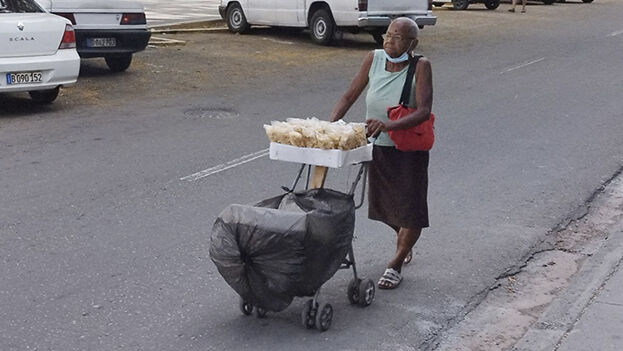
![]() 14ymedio, Havana, 3 March 2023 — Prices increased in Cuba 4.5 times more than salaries according to official data, although if other sources that measure sales in the informal market are consulted, prices multiplied by seven. This is reflected in the increasingly visible poverty in families that do not receive remittances, the only guarantee of survival in the context of the deepest economic crisis of the last 70 years.
14ymedio, Havana, 3 March 2023 — Prices increased in Cuba 4.5 times more than salaries according to official data, although if other sources that measure sales in the informal market are consulted, prices multiplied by seven. This is reflected in the increasingly visible poverty in families that do not receive remittances, the only guarantee of survival in the context of the deepest economic crisis of the last 70 years.
The data are extracted from an analysis by Cuban economist Pedro Monreal, who describes a “serious crisis of family consumption, a burden for economic growth and an ingredient of inequality and poverty,” in a series of messages on his Twitter account, with self-made graphs and data from the National Office of Information and Statistics (ONEI).
The official figures, however, must be carefully analyzed. The ONEI data show an evolution of the sales of goods and services from January 2021 to December 2022 that went from 39,913 million pesos ($1.597 billion) to 51,242 million pesos ($2.050 billion), a growth of 28.3% that is a mirage — a “softened” vision of reality, the economist calls it — since they are expressed in nominal terms; that is, the inflationary effect is not contemplated.
The two curves reflect an increase in nominal and real consumption in 2021, but the latter plummets throughout 2022. “An important explanatory factor is the different dynamics of wages and inflation,” explains Monreal.
In 2021, as part of the Ordering Task,* the Government made public the salary tables, which multiplied the existing salaries up to that time. The minimum wage rose to 2,100 pesos per month ($84) and the minimum pension to 1,528 ($61). It was the only variable, as Monreal recalls, that was in the hands of the State, because the prices were not, from the first moment.
Marino Murillo himself, designer of the reforms, said before the entry into force of the Ordering Task that the minimum wage was calculated from the estimated price for the basic basket: 1,300 pesos ($52). It had not been more than a few months when the now invisible official admitted that the cost was already around 3,000 pesos ($120).
The ineffectiveness of the measures was seen very early, but even at that time sales in real terms rose, reaching a peak at the end of the year of about 51 billion pesos ($2 billion). But in 2022 the debacle begins “with an official consumer price index that grew almost 4.5 times more than the average salary and that, when other sources are used, indicate a price increase 7 times higher than the salary increase,” says the economist.
The average monthly salary went from 1,194 Cuban pesos ($48) in 2020 to 3,830 ($160) in 2021 (221%), which allowed inflation to be cushioned in spite of everything. However, in 2022, it only grew by 8.1%, to 4,142 Cuban pesos ($153), remaining completely useless in the face of the dizzying increase in the cost of living.
At the end of 2022, the official rise in prices was 39%, although the most alarming thing was the rise in the cost of food, which rose to 62.9%. Even more serious is the fact that the accounts of the informal economy place the real inflation of the year at 140%, coupled with a devaluation of the Cuban peso against the dollar of -57.65%.
Pedro Monreal is categorical: “The continuation of a contraction of real sales of goods and services, or their stagnation, would not be compatible with economic growth. Household consumption is a crucial component of demand, representing approximately 57% of GDP (Gross Domestic Product).”
The economist, in addition, adds another enlightening number, which is that more than a million workers earn less than the average salary, “so it is plausible to assume that inflation has had a great negative impact on poverty and inequality in Cuba.”
Although there are no official poverty statistics on the Island, a report by the Cuban Observatory of Human Rights, based in Madrid, revealed last October that 72% of Cubans live below the poverty line. In addition, of those who said they have problems even buying the most essential things to survive, 27% receive remittances and 65% do not, consolidating the class difference in a country that made a Revolution to abolish inequality.
*Translator’s note: The Ordering Task is a collection of measures that include eliminating the Cuban Convertible Peso (CUC), leaving the Cuban peso as the only national currency, raising prices, raising salaries (but not as much as prices), opening stores that take payment only in hard currency, which must be in the form of specially issued pre-paid debit cards, and a broad range of other measures targeted to different elements of the Cuban economy.
Translated by Regina Anavy
____________
COLLABORATE WITH OUR WORK: The 14ymedio team is committed to practicing serious journalism that reflects Cuba’s reality in all its depth. Thank you for joining us on this long journey. We invite you to continue supporting us by becoming a member of 14ymedio now. Together we can continue transforming journalism in Cuba.
